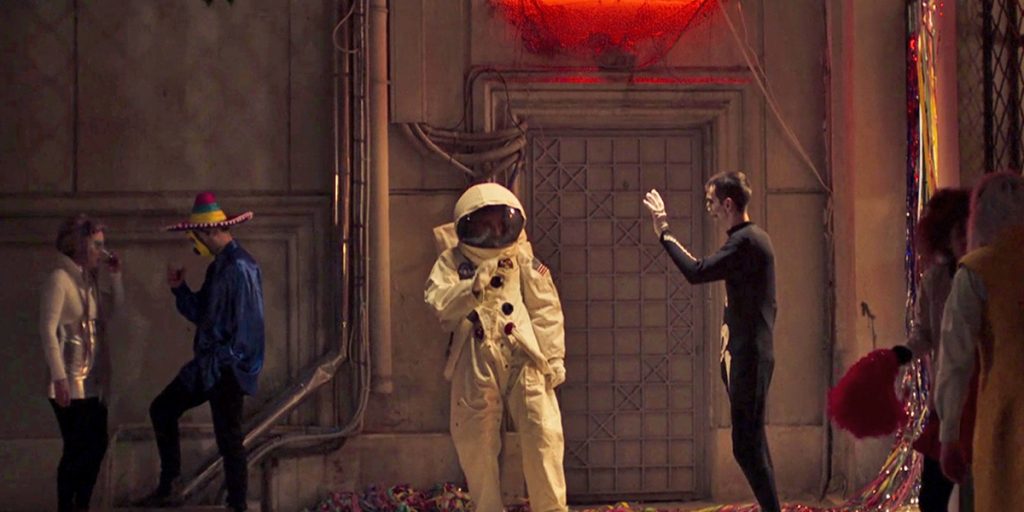Apples (2022) explores the experience of memory, imagining a world suffering from an amnesia outbreak in this absurd yet thoughtful debut feature from Christos Nikou.
A mysterious, widespread affliction has broken out, the victims suffering not from a fatal viral disease but memory loss. Patients are taken a hospital to be accounted for, where they are to be claimed by family members, while the unclaimed are either kept there or given the opportunity to create a new life for themselves. Apples (ΜΗΛΑ), the writing and directorial feature debut of Christos Nikou, takes us on the journey of an amnesiac patient as we follow Aris (Aris Servetalis) through his experiences creating new memories and a new life. One night, Aris is found on a bus and an ambulance takes him to the hospital where he is catalogued as patient number 14842. With no family to claim him, he will be held in the hospital indefinitely, but a doctor (Anna Kalaitzidou) tells him about the “New Identity” program, where he can “begin a new life and create new experiences and memories.”
Aris accepts the offer and is moved into an apartment in the city. Everyday, he is sent a tape recording from another doctor (Argyris Bakirtzis), with instructions for tasks to complete and a Polaroid camera to take photos of his new experiences. The tasks are simple at first, such as riding a bike and attending a party, then become more complicated, like driving a car outside of the city and visiting a dying patient in a hospital. One night, while watching The Texas Chainsaw Massacre at a cinema, Aris meets Anna (Sofia Georgovassili), another amnesiac patient undergoing the same experimental treatment. Making a new friend, Aris discovers connection in this new life, but he soon finds himself troubled by the later tasks he is asked to complete, forcing him to reckon with his own memories and the new life he is creating for himself.
Apples portrays memory in a unique light, celebrating the joys of creating new experiences and recognizing the sense of loss and even “death” from amnesia. New experiences are approached with the childlike naivety of the amnesiac patients, seen in humorous moments like Aris trying to ride a child’s bike or an inexperienced Anna driving a car through the forest, unfazed by crashing into a tree. Witnessing experiences with new eyes, these characters explore the world with wonder and curiosity. The photographs they take of their experiences—Polaroid selfies—draw a connection between image and memory that adds greater purpose for the film as this story is told through a visual medium.

However, memory also carries an inherent sense of pain. Remembrance of past memory evokes profound longings, sadness, even deep traumas. The film also reminds us that memory is an essential part of identity — the disappearance of memory is an erasure of the self. The patients who have lost their memory are not the same selves they once were, they are now a blank slate that can never return to their past lives. The cases of mass amnesia are an act of destruction, yet also become an act of creation, a reset, a renewal. Memory, as the film suggests, is many things — joyful, painful, a necessary feature of the human experience.
Viewers will no doubt draw comparisons between Apples and the films of Yorgos Lanthimos, Greece’s latest popular cinematic export and absurdist auteur — meticulously framed static shots (the square aspect ratio appearing like the Polaroid photographs), a cold and drab color palette, the slightly off-kilter tone, classical music, and dry, sparse dialogue. And the connections aren’t just limited to Apples‘ familiar aesthetic approach — Nikou served as a second assistant director on Lanthimos’ 2009 breakout feature Dogtooth (Κυνόδοντας), so it’s easy to see where this film’s tonal and visual inspiration comes from.
However, what distinguishes Apples from being just a Lanthimos-inspired carbon copy is its distinct emotional core. Instead of a calculated, detached sense of pure weird, Nikou imbues Apples with an understated solitude defined by thoughtful, silent gestures. There are no bold declarations, only modest occurrences and wordless revelations that manifest through small moments of warmth and melancholy. As the film unravels itself to reveal its deepest, most intimate secrets inside, just like how Aris peels the skin around an apple, the narrative takes an unexpected emotional turn with a confession that adds greater purpose to the story and characters that will rest in one’s mind beyond the final frame. Apples is nothing like the film its odd premise poses, but something more, and not to be missed.
Apples (ΜΗΛΑ) premiered at AFI Fest on October 20, 2020, and is now available to watch on digital and on demand. Read our review of Christos Nikou’s Fingernails.

 loudandclearreviews.com
loudandclearreviews.com
